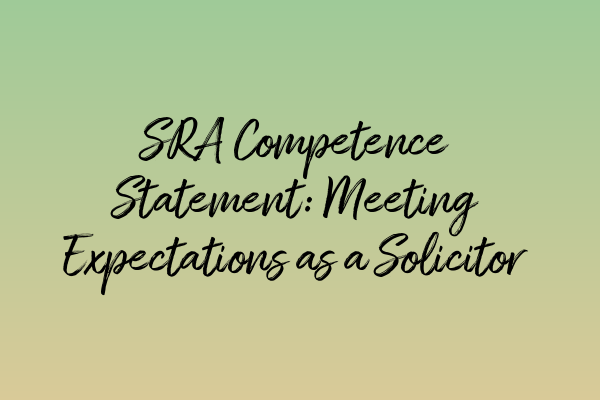SRA Competence Statement: Meeting Expectations as a Solicitor
As a solicitor, it is crucial to meet the expectations set by the Solicitors Regulation Authority (SRA) to ensure you are competent and capable in your role. The SRA Competence Statement outlines the key areas that solicitors must excel in to provide high-quality legal services to their clients. In this article, we will explore the various aspects of the Competence Statement and provide insights on how to meet these expectations effectively.
1. Ethics, professionalism, and judgment
The first pillar of the Competence Statement focuses on ethics, professionalism, and judgment. Solicitors are expected to demonstrate integrity, act in the best interests of their clients, and maintain the highest standards of professional conduct. Upholding ethical values is essential for building trust with clients and the wider legal community.
To enhance your ethical and professional judgment skills, it is crucial to stay updated with the SRA Code of Conduct and attend relevant training sessions. Regularly reflect on ethical dilemmas you encounter in your practice and seek guidance from senior solicitors or professional bodies to ensure your decisions align with the required standards.
2. Technical legal practice
The second pillar of the Competence Statement emphasizes technical legal practice. Solicitors must have a solid foundation of legal knowledge and the ability to apply it effectively to solve complex legal problems. Continuous professional development (CPD) plays a vital role in staying updated with new legal developments and maintaining your technical proficiency.
Legal research skills are essential in delivering accurate and reliable advice to clients. Unlocking Legal Research Skills for SQE Success provides helpful insights on enhancing your research skills to excel in your professional practice. Remember to critically evaluate the sources you use and ensure they are credible and up-to-date.
3. Working with others
Collaboration and effective communication are key skills for solicitors. The Competence Statement highlights the importance of working with others in a professional and respectful manner. As a solicitor, you will often work in teams, both within your firm and with external stakeholders such as clients, barristers, and other professionals.
SQE2: Everything You Need to Know About the Second Stage Exam offers valuable information on the practical legal skills required for successful interactions with clients and colleagues. Understanding the dynamics of teamwork, effective delegation, and active listening are crucial for establishing strong professional relationships.
4. Managing yourself and your work
Time management and organizational skills are critical for solicitors to meet client expectations and handle multiple tasks efficiently. The Competence Statement emphasizes the need to manage your workload effectively while maintaining high standards of quality and professionalism.
If you are re-taking the SQE or seeking strategies for success, Re-taking the SQE: Strategies for Success provides valuable guidance on effective study plans, stress management, and self-assessment techniques. Adopting good time management practices, such as prioritizing tasks, setting achievable goals, and managing deadlines, will greatly contribute to meeting this aspect of the Competence Statement.
5. Equality, diversity, and inclusion
Promoting equality, diversity, and inclusion is a fundamental expectation in the legal profession. Solicitors should be aware of the potential biases and barriers that can impact their work and interactions with clients and colleagues. It is essential to create an inclusive environment that respects and values individual differences.
To further develop your understanding of equality, diversity, and inclusion, considering core concepts for SQE candidates, Functioning Legal Knowledge (FLK): Core Concepts for SQE Candidates offers a comprehensive guide. Being knowledgeable about relevant legislation, understanding unconscious biases, and actively challenging discriminatory behavior are critical steps in promoting an inclusive legal practice.
In conclusion, meeting the expectations outlined in the SRA Competence Statement is of utmost importance for solicitors. By focusing on ethics, professionalism, technical legal practice, working with others, managing yourself and your work, and promoting equality, diversity, and inclusion, you will not only meet the SRA’s requirements but also excel in your professional practice.
Keep in mind that the Competence Statement is not static, and it is essential to stay updated with any revisions or advancements. Continuously expanding your legal knowledge, enhancing your skills, and seeking opportunities for professional development will greatly contribute to your success as a solicitor.
Case Studies in SQE: Applying Knowledge to Real-Life Scenarios offers insights into practical application, enabling you to connect theory with real-life legal situations. By integrating these resources into your professional journey, you will be well-equipped to meet and exceed the expectations set forth by the SRA Competence Statement.
[Please add other relevant links here if required]
Remember, meeting the SRA Competence Statement is an ongoing process that requires dedication, continuous learning, and an unwavering commitment to professionalism. By embracing the competencies outlined and investing in your professional growth, you will stand out as a competent and trustworthy solicitor in the legal community.


Leave a Reply